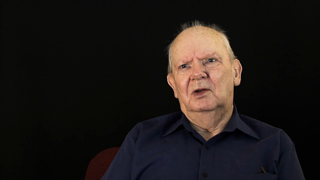5:40 | Herman Buffington was First Scout, which meant he was alone and under fire often. He was always hoping the others would catch up and spread the fire around a little. The Japanese snipers were good shots, and way too many had survived the merciless shelling from the Navy's big guns. He was also the company Runner, a storied position in the Army.
Keywords : Herman Buffington Okinawa scout sniper artillery 16 inch guns cave Japanese runner

The training for Herman Buffington was centered around invasion assaults and he made many landings on the West Coast to prepare for the trials ahead. He shipped out for the Pacific just in time to take part in mop-up operations on Saipan.
Herman Buffington continued his training on Saipan, learning to coordinate with larger forces on amphibious invasions. There weren't many Japanese left, but some of the stragglers would sneak down out of the hills to watch, from a distance, the movies the Americans screened at night in the open air.
Herman Buffington explains how it's more difficult than it sounds to get from the rope ladder on a troop transport into the Higgins Boat waiting at the bottom. When they stormed ashore at Okinawa, there was no opposition at first, but that would soon change, especially the snipers. The Americans learned to judge how close the shot was by the sound of the bullets that missed them. If they got closer, you had to make some decisions.
Herman Buffington was hunkered down in his foxhole on Okinawa when a mortar round hit close by and a piece of red hot shrapnel tore through his leg. It sounded like bacon frying, but a medic got the bleeding stopped and he was going to be OK. He refused the morphine because he was already exhausted and didn't want anyone else to tend to his tourniquet.
They were about eight in number and they came in with a white flag. Suddenly they all dropped to the ground, and the Americans were in for a surprise. Known for not surrendering, many of them changed their minds when all hope was over and they massed on the beach and waited for the Americans.
They were trying to take a ridge on Okinawa where the Japanese had dug trenches and the persistent Americans tried repeatedly to take the position. Herman Buffington got close enough to vault over into a trench where he used the old helmet-on-a-bayonet trick to judge the enemy fire. He received the Bronze Star for his actions in this firefight.
Herman Buffington pays tribute to one of his Sergeants on Okinawa, William B. "Willie B" Holeman, who was known for not sending his men anywhere he wouldn't go. Willie B was trapped on a small hill and surrounded by the enemy when Buffington took a group of volunteers to get him and his men out of there.
Herman Buffington was taking some potshots at Japanese troops on the other side of a large ravine where they were foolishly cooking their rice out in the open. When an officer came by and asked how he was doing, he remarked that he was trying to mix a little lead with the rice. The man asked for the rifle so he could give it a try and he proved to be an excellent shot. Buffington could smell the brass and he was right. It was General Simon Buckner.
It was late night guard duty and Herman Buffington heard something. Then he saw a figure crouched in the brush. When the next flare went up, he sighted and fired. The figure didn't move so he shot him again. When he found out why there was no reaction, all he could do was laugh. He did get a souvenir out of the encounter, a silk Japanese flag.
With many others, Herman Buffington was preparing for the dreaded Japan invasion when the atomic bomb ended the war. That was great news for him, just back with his unit. He had been in the hospital recovering from a shrapnel wound when a red haired lady from the Red Cross caught his eye. This was going to be trouble, he thought.
Herman Buffington recalls two peculiar incidents from his time in the Philippines after the war. One involved several hundred new Jeeps headed for the bottom of the ocean. The other involved a thankless assignment as a lifeguard.
The man had been shot up pretty bad, remembers Herman Buffington, who carried him back to the camp. All the way the wounded soldier had pleaded with him to leave him there, but once safe in a foxhole, he wouldn't let go of Buffington's hand, even when the medics prepared to evacuate him.
Herman Buffington displays his Bronze Star and Purple Heart, along with the rest of his decorations from Saipan and Okinawa. He pays tribute to today's soldiers and explains how he never understood the importance of what he was doing in combat.